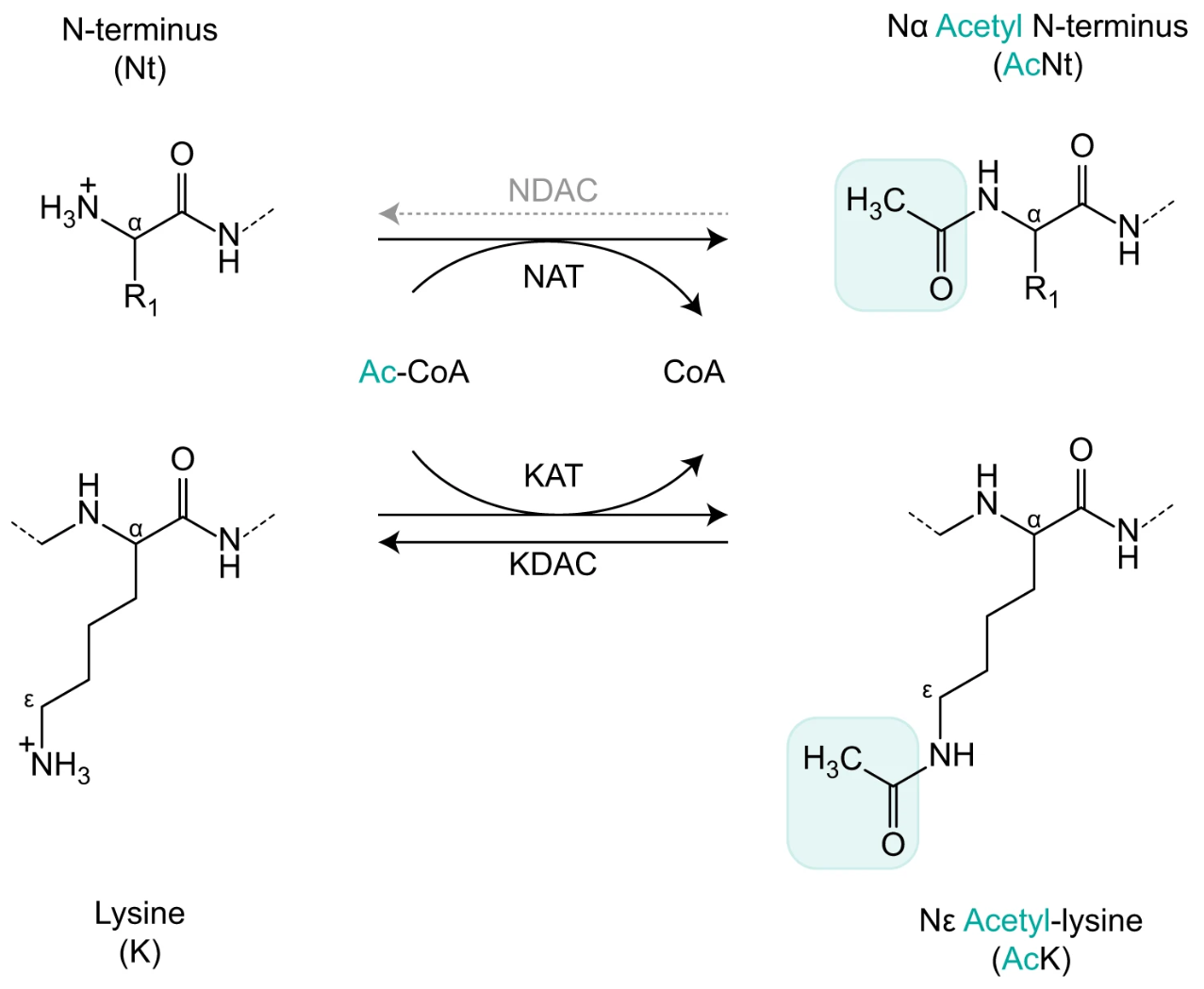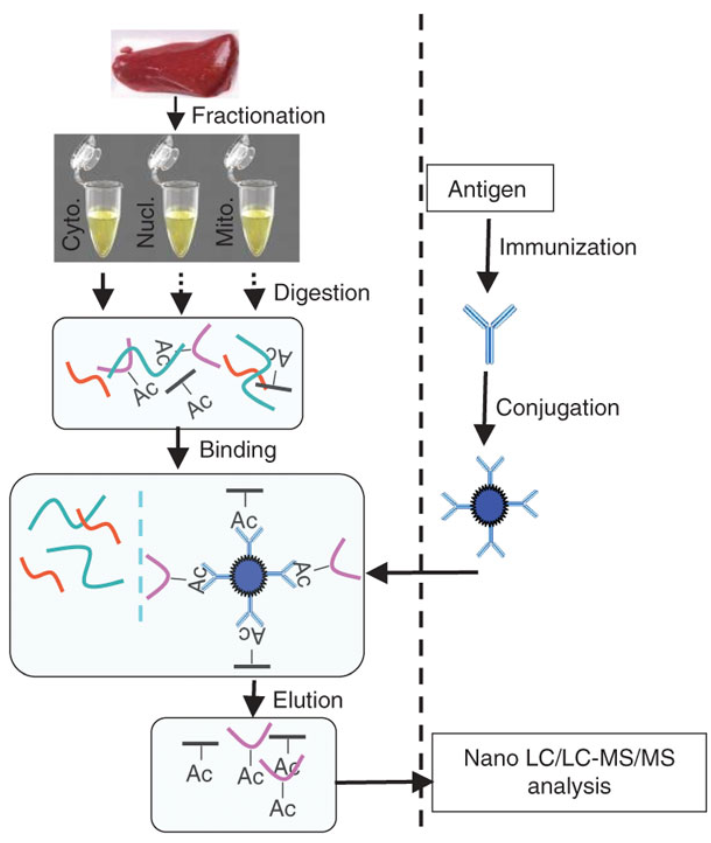Acetylated Peptide Enrichment Service
- Epigenetic Regulation Studies: Profiling histone acetylation patterns involved in chromatin remodeling and gene expression control.
- Cancer Research: Investigating aberrant acetylation of oncogenes, tumor suppressors, and regulatory proteins in cancer progression.
- Metabolic Pathway Analysis: Exploring acetylation-mediated modulation of metabolic enzymes and signaling networks.
- Neurodegenerative Disease Mechanisms: Characterizing acetylation changes in neuro-related proteins associated with disorders such as Alzheimer’s and Parkinson’s disease.
- Biomarker Discovery: Evaluating compound effects on acetylation profiles and identifying acetylation-based biomarkers.
- Storage and Shipping: Samples should be stored at -80℃ and shipped with dry ice.
Protein acetylation is a fundamental post-translational modification (PTM) that plays a critical role in regulating protein function, localization, stability, and interaction networks. With extensive expertise in PTM proteomics, MtoZ Biolabs offers specialized Acetylated Peptide Enrichment Services to support researchers in characterizing site-specific acetylation events with high precision and sensitivity.
Protein acetylation involves the covalent attachment of an acetyl group (–COCH₃) from acetyl coenzyme A to specific amino acid residues. This modification occurs in two major forms: N-terminal acetylation, which targets the α-amino group at the protein’s N-terminus, and lysine side-chain acetylation, which modifies the ε-amino group of internal lysine residues. N-terminal acetylation is generally catalyzed by N-terminal acetyltransferases (NATs) during protein synthesis and is considered irreversible. In contrast, lysine acetylation is a dynamic and reversible process regulated by lysine acetyltransferases (KATs) and deacetylases (KDACs), modulating charge state and structural flexibility of proteins.

Figure 1. Schematic Outline of N-Terminal and Lysine Protein Acetylation
Protein acetylation was first identified in histones, where it plays a critical role in regulating chromatin structure and gene expression. By neutralizing the positive charge of lysine residues, histone acetylation reduces histone-DNA affinity, promoting a more relaxed chromatin state and facilitating transcriptional activation. However, subsequent studies have revealed that acetylation extends far beyond histones. It modifies a broad range of non-histone proteins involved in diverse cellular pathways, including transcriptional regulation, DNA repair, RNA metabolism, cytoskeletal remodeling, signal transduction, and enzymatic activity control. Dysregulation of protein acetylation is associated with numerous pathophysiological conditions, including cancer, metabolic disorders, inflammatory diseases, and neurodegeneration, underscoring its significance as a regulatory mechanism in health and disease.
Service at MtoZ Biolabs
Given its low stoichiometry and dynamic nature, acetylation analysis often requires targeted enrichment prior to mass spectrometry to ensure sensitive and accurate detection. MtoZ Biolabs' Acetylated Peptide Enrichment Service is designed to selectively isolate acetylated peptides from complex biological samples and enhance downstream LC-MS/MS detection. Our enrichment workflows integrate multiple proven strategies, which can be tailored based on sample type and experimental goals. To improve the depth and specificity of acetylated peptide identification, we offer a approach combining pre-fractionation and targeted enrichment:
💠Pre-fractionation: Prior to enrichment, peptide mixtures can be separated using high-resolution techniques such as strong cation exchange (SCX), hydrophilic interaction liquid chromatography (HILIC), or reversed-phase liquid chromatography (RPLC). These methods reduce sample complexity, enhance proteome coverage, and improve detection sensitivity for low-abundance acetylated species.
💠Affinity enrichment: Following fractionation, high-affinity anti-acetyllysine antibodies are employed to selectively capture acetylated peptides from each fraction. This antibody-based immunoaffinity approach ensures high specificity and minimal background interference, facilitating reliable site-level characterization.

Figure 2. Schematic Diagram of Enrichment of Acetylated Peptides from Human Liver
Service Advantages
✅Advanced Analytical Platform: Combines antibody-based affinity enrichment, multi-mode pre-fractionation (SCX, HILIC, RPLC), and high-resolution LC-MS/MS to achieve high specificity, sensitivity, and depth in acetylation profiling.
✅Customizable Workflows: Flexible protocols tailored to different sample types, species, or research objectives.
✅Comprehensive Bioinformatics Support: Delivers site-level annotation, quantitative comparison, and functional interpretation for downstream analysis.
✅One-Time-Charge: Our pricing is transparent, no hidden fees or additional costs.
Applications
MtoZ Biolabs’ Acetylated Peptide Enrichment Service supports a wide range of research and translational applications, including but not limited to:
Sample Submission Suggestions

*Note: If you have specific requirements or need guidance on sample preparation, please do not hesitate to contact us.
Deliverables
1. Comprehensive Experimental Details
2. Materials, Instruments, and Methods
3. Total Ion Chromatogram & Quality Control Assessment (project-dependent)
4. Data Analysis, Preprocessing, and Estimation (project-dependent)
5. Bioinformatics Analysis
6. Raw Data Files
Acetylated peptide enrichment is an indispensable tool for researchers exploring the regulatory landscape of protein acetylation. MtoZ Biolabs is committed to delivering high-quality acetylation analysis services by integrating optimized enrichment protocols with high-resolution MS and expert-level bioinformatics. In addition to acetylation profiling, MtoZ Biolabs offers a comprehensive suite of post-translational modification (PTM) analysis services, including phosphorylation, ubiquitination, glycosylation, SUMOylation, and others. Free project evaluation, welcome to learn more details!
Related Services
Acetylation Site Identification Service
Acetylated Protein Analysis Service
Post-Translational Modifications Proteomics Service
How to order?







